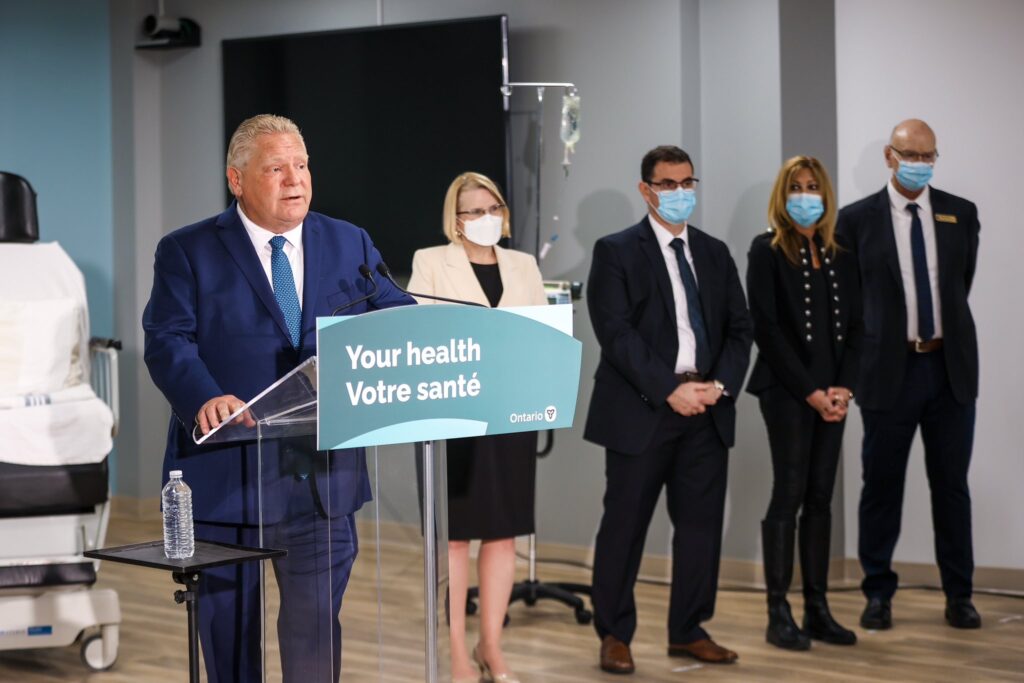ONTARIO – Across Ontario, there are approximately 206,000 people waiting for surgery. Now all eyes are on the province yet again, after officials provided another update on the state of Ontario’s healthcare system on Monday. The provincial government has revealed a new plan that aims to combat Ontario’s growing surgical backlog.
The new plan is made up of three parts, using the province’s community surgical and diagnostic centres, according to provincial officials. Under the new plan, surgeries performed at these centres will be publicly funded.
Three-Step Plan to Address Surgical Backlog
Step One: The province is working to tackle the current backlog for cataract surgeries, which has one of the longest waitlists. Through new partnerships with community surgical and diagnostic centres in Windsor, Kitchener-Waterloo, and Ottawa, surgeons will be performing an additional 14,000 cataract surgeries a year.
The province is also dedicating over $18 million to existing centres to cover care for thousands of patients. This includes over 49,000 hours of MRI and CT scans, 4,800 cataract surgeries, 900 other ophthalmic surgeries, 1,000 minimally invasive gynaecological surgeries and 2,845 plastic surgeries for things like soft tissue repair.
Provincial officials say that if this plan goes off without a hitch, they anticipate surgical wait lists returning to pre-pandemic levels by March of this year.
Step Two: Ontario is also expanding the scope of community surgical and diagnostic centres, aiming to meet specific needs within different regions. This will include a continued focus on treating cataracts, as well as MRI and CT imaging, and colonoscopy and endoscopy procedures. Starting as early as this year, these procedures will be deemed non-urgent, low-risk and minimally invasive. This will help hospitals to focus their resources on complex and high-risk surgeries.
Step Three: This February, officials will introduce legislation that will, if passed, allow existing community diagnostic centres to conduct more MRI and CT scanning. This allows people to access publicly funded diagnostic services faster and closer to home. Beginning in 2024, the third step of the healthcare action plan will expand surgeries for hip and knee replacements. If passed the new legislation will also strengthen oversight of community surgical settings so that people in Ontario can receive world-class care. It will also provide the province with more flexibility to continue to expand access to more surgeries.
“When it comes to your health, the status quo is no longer acceptable,” said Premier Doug Ford in a statement.
You deserve faster and easier access to publicly-funded surgeries and procedures.
— Doug Ford (@fordnation) January 16, 2023
Our bold plan will deliver:
✅ Reduced wait times
✅ Improved access to care
✅ Care closer to home
All you need is your OHIP card—never your credit card. pic.twitter.com/vMEOnIOV6x
“Our government is taking bold action to reduce wait times for surgeries, all while ensuring Ontarians use their OHIP card to get the care they need, never their credit card,” Ford continued.
Under this new plan, the province will be investing over $300 million to combat the intense wait times for surgery in Ontario.
These new changes will be permanent, allowing the province to work through a long list of people waiting for operations. While there are currently 206,000 people estimated to be waiting for surgical procedures in Ontario, this is down from 209,000 last fall, and up from around 200,000 pre-pandemic.
The new plan prioritizes people who have been waiting for surgery longer than clinical guidelines suggest.
People in Ontario React to the New Plan
There has been a strong reaction to the news across Ontario. Many people, including healthcare professionals like nurses and doctors, have taken to the internet to air their grievances with the announcement.
Five healthcare unions across the province have spoken out against the move. The unions include CUPE/OCHU, Ontario Nurses’ Association, OPSEU/SEFPO, SEIU Healthcare, and Unifor. They say that this move will “further starve our public healthcare system of funding and divert front-line staff to enrich private shareholders and diminish access to publicly-delivered healthcare.”
ONA along with 4 other healthcare unions are calling on @fordnation to halt his plan for private, for-profit surgical clinics: a risky venture that will cost Ontarians dearly and damage access to public care.
— Ontario Nurses' Association (@ontarionurses) January 16, 2023
Read more: https://t.co/WehAt8050m #ONpoli pic.twitter.com/kf4I2wPKeQ
“Unions need to be gearing up to strike to stop this and get Ford out of power. If we just settle for a delay on this particular issue he will just keep coming and undermining our healthcare system even further. If healthcare workers don’t act now it will be harder in the future,” wrote one man on Twitter.
How can for-profit surgical centres which are OHIP covered also make profits for investors or shareholders?
— Dr. Amit Arya (@AmitAryaMD) January 17, 2023
– Pressuring patients to buy uninsured services a.k.a “upselling”
– Overcharging government for same services
– Cutting corners on quality of care
How is this acceptable?
“I’m sorry, but as a disabled person living in Ontario, Canada, Doug Ford’s plan to privatize our system will mean that disabled people, many of whom live on less than $800/month will have trouble accessing the already broken, inaccessible healthcare system,” tweeted out Disability Awareness Consultant Andrew Gurza.
Let us know in the comments, how do you feel about this plan?










